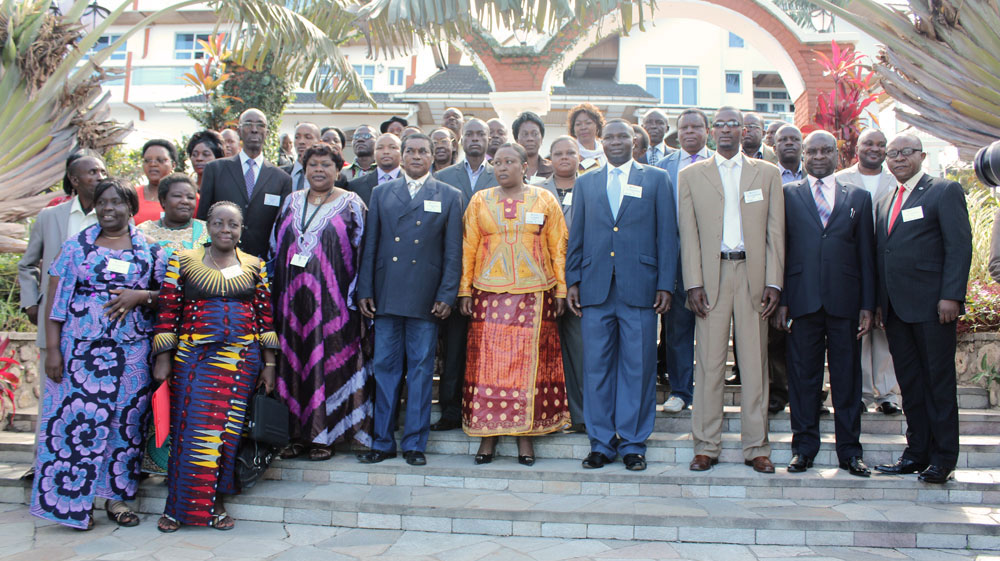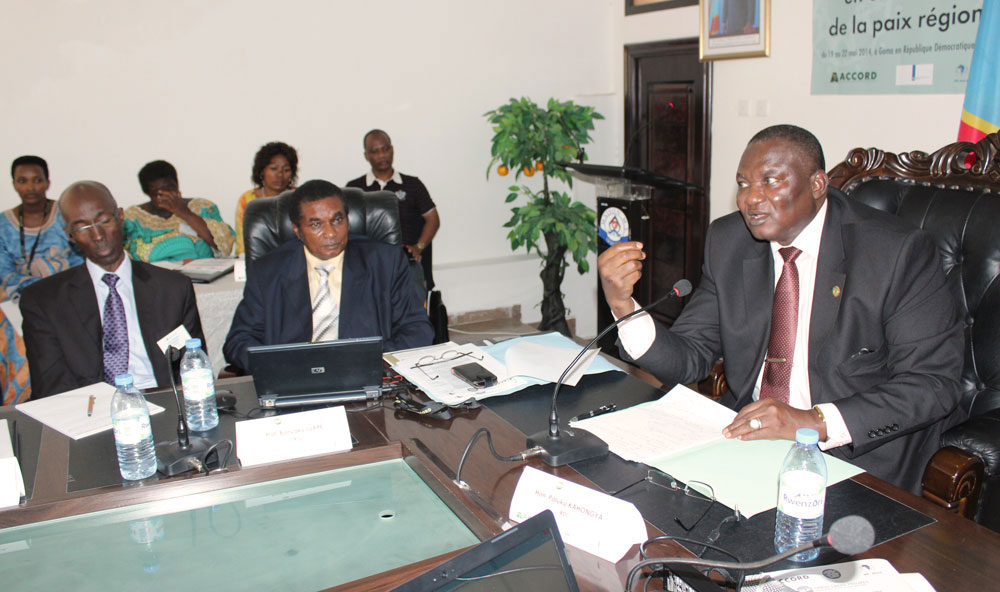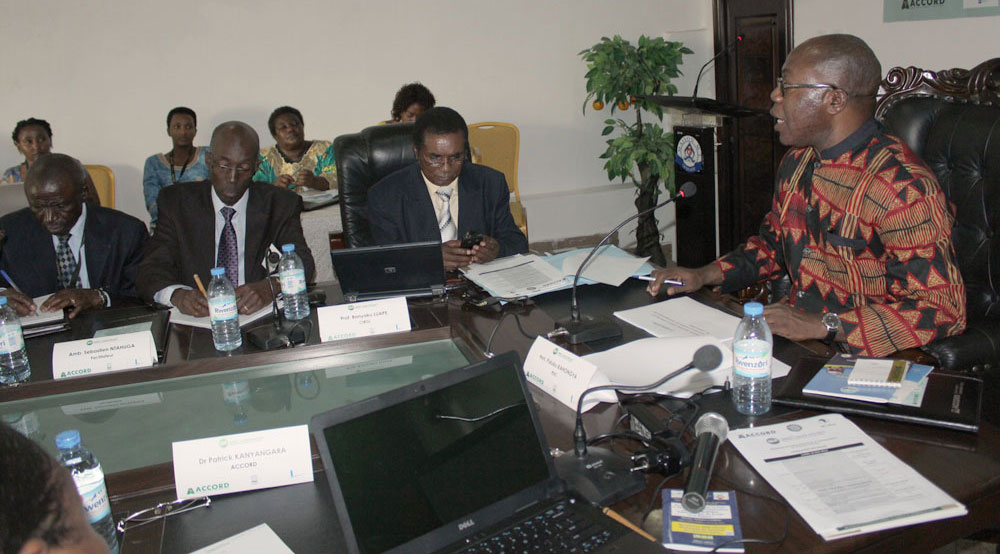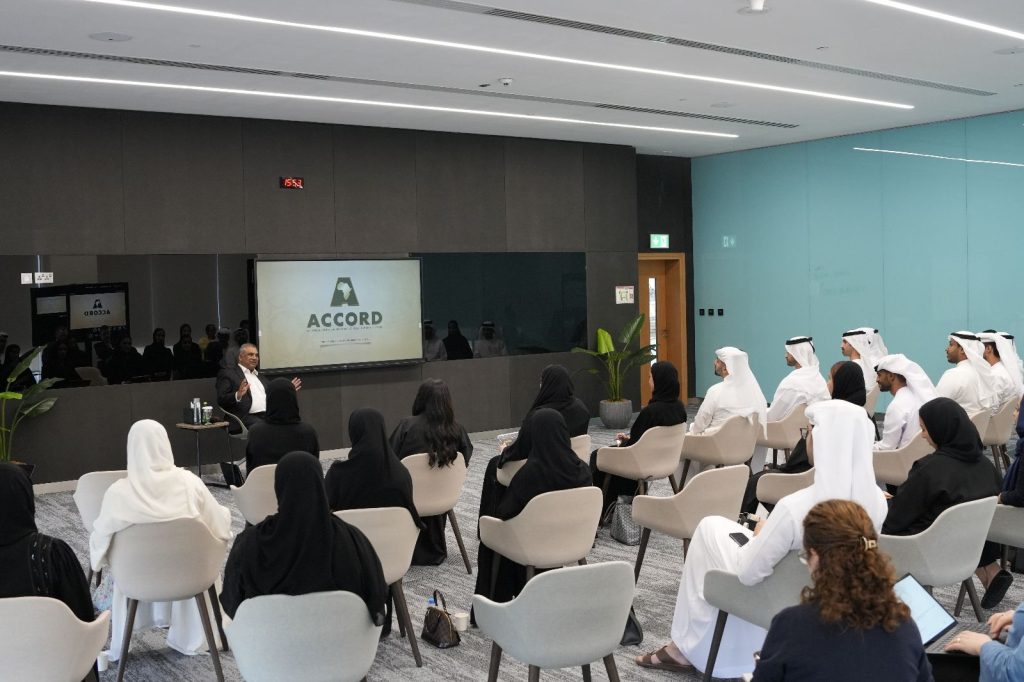The ACCORD Great Lakes Project (GLP), in collaboration with the DRC National Coordination Office of the International Conference on the Great Lakes (ICGLR), has conducted a Regional Peacebuilding Training in Goma, Democratic Republic of Congo (DRC).
The training targeted representatives from Civil Society Organisations (CSOs) from the four focus countries of the GLP, namely; Burundi, Democratic Republic of Congo (DRC), Rwanda and Uganda. The training served as an ideal platform for CSO to reflect and explore on areas of plausible collaboration in peacebuilding initiatives in region. Participants had a chance to familiarise themselves with the work of the ICGLR at both national and regional levels and share the experiences from their respective countries. Participants were encouraged to hold frank discussions on the importance of understanding their role as civil society in peacebuilding efforts in the region.

The training, which took place from 19 – 22 May 2014, gathered civil society representatives from North Kivu, South Kivu, Ituri and Kinshasa in DRC as well as from the immediate neighbouring countries; Burundi, Rwanda and Uganda. DRC government officials also attended the training in confirmation of the importance of a multi-stakeholder approach to peacebuilding. The four-day training comes after similar trainings have been carried out in Burundi (November 2013 by ACCORD) and Uganda (in March 2014 by the Nairobi Peace Initiative (NPI-A).
In his opening speech, Hon. Paluku Kanyongya, the Governor of the North Kivu Region of DRC lauded the regional approach taken by ACCORD and its GLP partners, notably the Nairobi Peace Initiative – Africa (NPI-A) and the Global Partnership for the Prevention of Armed Conflict (GPPAC). He emphasised on the importance of understanding the role that civil society organisations can play in peacebuilding efforts and advised the participants to note that their role requires huge sacrifices that come with responsibility. Hon. Paluku emphasised on the centrality of understanding the instruments available to guide peacebuilding efforts in the region notably the Peace, Security and Cooperation Framework also known as the Framework of Hope and the need for Civil Society to understand these instruments in order to apply and follow up on their effective implementation.
In a particular session on the African Union (AU) perspective of peacebuilding in the Great Lakes Region, H.E. Boubacar Diarra, the AU Special Envoy to the Great Lakes Region lauded the tremendous milestones that have been made since the signing of the Framework of Hope in Addis Ababa, on 24th February 2013. He reiterated the importance the AU puts on local ownership in recognition of the principle of subsidiarity that encourages regional mechanisms to get more involved and take the lead in finding solutions to issues that affect their respective regions. For the Great Lakes Region, Diarra underscored the need to pay great attention to the refugee crisis for the better stability of the region. In reference to ACCORD’s abbreviation and raison d’être, H.E. Diarra in his parting words to the participants stated “it is my hope that indeed through civil society initiatives and efforts it would be possible to constructively transform the conflicts and crises that have afflicted Africa and specifically the Great Lakes Region, into mere disputes as ACCORD advocates”.
H.E. Ambassador Vicente Muanda, the Deputy Executive Secretary of the ICGLR facilitated a session on regional peacebuilding instruments giving the participants essential information on the respective documents and how they can be used in consolidating peace in the region. The collaboration between ACCORD and the ICGLR cements the ongoing MoU between the two institutions.
Participants had the opportunity to work in groups to apply the skills imparted and to enumerate key recommendations that need to be taken into consideration by the Regional Civil Society Forum (RCSF) of the ICGLR, the ICGLR as an institution and other major players implementing peacebuilding initiatives in the region. A session on the importance of election processes in peacebuilding was presented as a means of giving participants real experiences from Madagascar and Central African Republic and thus encouraging experience sharing from similar post-conflict contexts. The incorporation of Gender dimension in peacebuilding was reiterated by the ICGLR Programme Officer for Gender Ambassador Elaine Mokodopo with representatives from each of the four focus countries sharing on the progress made in their respective countries in implementing the UN Resolution 1325. These experiences accentuate ACCORD’s mantra that advocates for the use of African solutions for African challenges. As part of the key recommendations and noting the particular interdependent nature of the Great Lakes region, participants were encouraged to advocate for the promotion of dialogue towards building a peaceful coexistence in the Great Lakes Region given the interconnected nature of the region and specifically amongst the four countries represented.

The Great Lakes Project at ACCORD is a regional initiative funded by the Dutch Ministry of Foreign Affairs that aims at contributing to peacebuilding in the Great Lakes Region through encouraging concerted efforts of the four countries directly affected by the crisis that has lasted several years. GLP aims at building the capacity of civil society organisations (CSOs), creating links between CSOs and the ICGLR both at national and regional and the encouragement of a multi-stakeholder approach to peace consolidation in the region. GLP work with ICGLR Secretariat in preparation for the ICGLR Extraordinary Summit on Youth Unemployment in the region in July this year and will also conduct a regional mediation and peacebuilding training for women later in the year.








